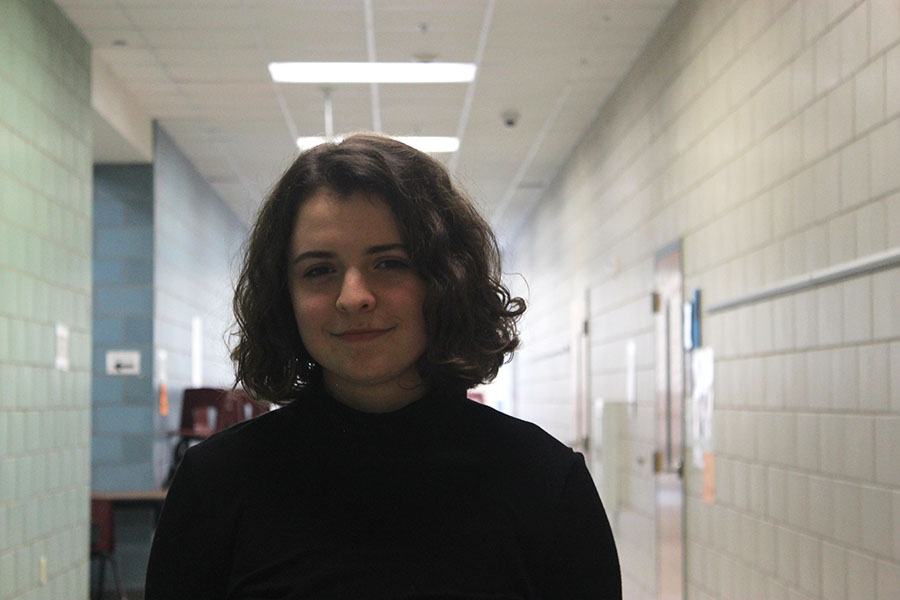“I remember going up there and seeing my name and I couldn’t believe it. It was really exciting.”
Senior bassoon player Hannah Stephens
Q: What does being a state qualifier mean to you?
A: “I think it really means not only being a good musician, but having the work ethic and the motivation to put in all that time on the audition music.”
Q: How long did you have to prepare for state?
A: “I got my music in July or August. Then, we auditioned for region in December. [I] advanced [and] auditioned for area the week after winter break.”
Q: Do you remember the exact moment you found out you made it? How did you feel?
A: “I was really excited. I actually ended up making first in my area. I did not think I was gonna make first because I knew one of the kids I was auditioning against and he was really good. I thought he was gonna get it, because he got [first] in the past. I remember going up there and seeing my name and I couldn’t believe it. It was really exciting.”
Q: What was the biggest challenge in preparing for this audition?
A: “I think the biggest challenge is keeping yourself motivated because it’s such a long amount of time on the same music, so you get tired of it. If you peak too early, then you start regressing.”
Q: Have you qualified before? If not, what do you think helped you qualify this time around?
A: “I haven’t qualified before, this is my first year qualifying. I definitely had a different attitude going into it, I was more motivated and I kind of knew how to practice and prepare for it. I was [also] getting a lot of help from Mr. Agwu every week. He was really helpful and encouraging. [He] gave me a lot of really good feedback for my etudes.”
Q: Do you have a particular routine that you follow in preparation for auditions like this?
A: “[First], it’s getting the notes under my fingers and then I start to do detailed work. When I start on [new] music, I go really slow, and [as I] get closer to the audition, I will run the whole etude and then I’ll go back and work on things that need work and then I’ll run it again at the end of my practice session. [Before auditions] I try not to warm up so much and freak myself out. I’ll run whatever I’m auditioning on and if something’s messed up, then something’s messed up. It’s not gonna get better within whatever time I have to prepare.”
Q: Besides band, what else are you involved in? How did you balance your schedule to ensure you had enough practice time?
A: “I kind of had to balance being a drum major with [practice] cause it’s kind of a separate thing. I made sure that I set times to practice for both conducting and for playing my bassoon, but really I didn’t have a lot of stuff this year [since] I’m a senior.”
Q: What advice do you have in terms of dealing with nerves during auditions?
A: “Really, a lot of what helped me was preparation. As long as you know that you’ve played it well before in practice time, it’s easy to be like ‘OK, I’m gonna be fine, I know I can do this.’ Also, I like to do a breathing exercise where I’ll inhale, hold my breath and then exhale, and I’ll do that until I feel better.”
Q: How do you stay patient while preparing for auditions?
A: “If I start to get tired of [the music], I’ll go play something else. Some practice methods we use are changing up the rhythms to get the notes under our fingers. That helps sometimes, too, when I’m getting tired of a piece, to change something up.”
Q: What do you hope to gain from this experience?
A: “I think the whole practicing experience has helped me a lot as a musician. I know how to practice better and I think my technique is definitely better but I’m looking forward to actually playing in the concerts and stuff. I think it’s going to be a really cool experience to get to play with such good musicians. Finally, all the work has paid off and I get to make music with people. That’s really cool.”
Q: Do you feel that this experience is life changing in any way? Why or why not?
A: “I don’t know that I would necessarily say life changing, but I feel like it’s definitely helped me a lot as a player and I definitely know how to motivate myself better and push through difficult challenges. Maybe a little bit.”
Q: What advice do you have for people hoping to make state in the future?
A: “It’s best to focus on yourself and your own work. I know whenever I would think about how prepared other people were going to be, I didn’t have a good practice session, so just focus on playing to the best of your ability and trying to make the etudes sound like real music. Really put work into making it sound like music instead of just playing it perfectly.”

